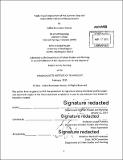| dc.contributor.advisor | Joseph Ferreira. | en_US |
| dc.contributor.author | Reeves, Halley Brunsteter | en_US |
| dc.contributor.other | Massachusetts Institute of Technology. Department of Urban Studies and Planning. | en_US |
| dc.coverage.spatial | n-us-ma | en_US |
| dc.date.accessioned | 2015-06-10T19:11:34Z | |
| dc.date.available | 2015-06-10T19:11:34Z | |
| dc.date.copyright | 2015 | en_US |
| dc.date.issued | 2015 | en_US |
| dc.identifier.uri | http://hdl.handle.net/1721.1/97341 | |
| dc.description | Thesis: M.C.P., Massachusetts Institute of Technology, Department of Urban Studies and Planning, 2015. | en_US |
| dc.description | Cataloged from PDF version of thesis. | en_US |
| dc.description | Includes bibliographical references (pages 37-41). | en_US |
| dc.description.abstract | Due to ever-increasing summer temperatures and a population with minimal technological adaptations to help them cope, extreme heat events will likely have a large impact on vulnerable populations in Massachusetts. As such, heat events are likely to impact the health of residents because they are related to a rise in all-cause hospital admissions and other health outcomes. We sought to clarify how Massachusetts may improve their extreme heat event response policies. To do so, we examined Massachusetts' current policies and best practices for extreme heat event response as well as the spatiotemporal weather and vulnerability patterns throughout the state. As a result, we found that varying the scale of response will be necessary based on the extent of different heat events. Additionally, the state ought to clarify who is in charge at the state and regional levels. By better addressing the needs of its populations during heat events, Massachusetts would likely prevent unnecessary hospital admissions and harm to its residents. | en_US |
| dc.description.statementofresponsibility | by Halley Brunsteter Reeves. | en_US |
| dc.format.extent | 63 pages | en_US |
| dc.language.iso | eng | en_US |
| dc.publisher | Massachusetts Institute of Technology | en_US |
| dc.rights | M.I.T. theses are protected by copyright. They may be viewed from this source for any purpose, but reproduction or distribution in any format is prohibited without written permission. See provided URL for inquiries about permission. | en_US |
| dc.rights.uri | http://dspace.mit.edu/handle/1721.1/7582 | en_US |
| dc.subject | Urban Studies and Planning. | en_US |
| dc.title | Public health implications of hot summer days and vulnerability indexes in Massachusetts | en_US |
| dc.type | Thesis | en_US |
| dc.description.degree | M.C.P. | en_US |
| dc.contributor.department | Massachusetts Institute of Technology. Department of Urban Studies and Planning | |
| dc.identifier.oclc | 910516631 | en_US |
